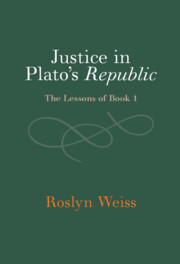Refine search
Actions for selected content:
6 results
Enemies
-
- Journal:
- Journal of the American Philosophical Association / Volume 11 / Issue 4 / December 2025
- Published online by Cambridge University Press:
- 11 August 2025, pp. 659-676
-
- Article
-
- You have access
- Open access
- HTML
- Export citation
13 - The Parable of the Pounds (Lk 19:1–27)
-
- Book:
- Luke's Unique Parables
- Published online:
- 28 February 2025
- Print publication:
- 06 March 2025, pp 155-172
-
- Chapter
- Export citation

Justice in Plato's Republic
- The Lessons of Book 1
-
- Published online:
- 24 January 2025
- Print publication:
- 16 January 2025
Chapter 3 - Polemarchus
-
- Book:
- Justice in Plato's <i>Republic</i>
- Published online:
- 24 January 2025
- Print publication:
- 16 January 2025, pp 52-91
-
- Chapter
- Export citation
3 - High Policing and Human Rights Lawyering in China
- from Part II - Authoritarian Policing: Past and Present
-
-
- Book:
- Regime Type and Beyond
- Published online:
- 25 May 2023
- Print publication:
- 08 June 2023, pp 53-86
-
- Chapter
- Export citation
10 - Conclusion
-
- Book:
- Hanging Together
- Published online:
- 07 July 2022
- Print publication:
- 21 July 2022, pp 179-182
-
- Chapter
- Export citation
